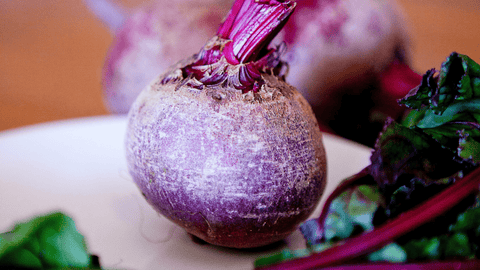This article explores the keto diet and its compatibility with beetroot, including beets, roasted beets, and beetroot powder. It outlines the fundamental aspects of a keto diet, such as carbohydrates and net carbs, permitted foods, and macronutrient ratios, and subsequently delves into the nutritional benefits of beetroot, including vitamin C, potassium, and antioxidants, and its potential incorporation into a meal plan.
The discussion includes an examination of whether beetroot aligns with keto guidelines, considering the carbohydrate content and serving size, along with the provision of appealing recipes for cooking beets, such as pickled beets, and an analysis of any associated risks of its consumption, including nutrient deficiency and blood sugar levels. Whether one is an experienced practitioner of the keto diet or just beginning their health journey, this article offers valuable insights to enhance their experience, focusing on portion control and eating beets for their health benefits.
What is a Keto Diet?
The ketogenic diet, commonly referred to as the Keto diet, is a low-carbohydrate dietary regimen that focuses on significantly reducing carbohydrate intake. This dietary approach encourages the body to enter a metabolic state known as ketosis, during which it efficiently utilizes fat for energy as its primary energy source instead of glucose, assisting in weight loss and stabilizing glucose levels.
Typically, the Keto diet restricts daily carbohydrate consumption to approximately 20 to 50 grams while promoting the intake of healthy fats and a moderate amount of protein. The primary objectives of this diet include enhancing weight loss, stabilizing blood glucose levels, improving cardiovascular health and activity, and supporting overall health and wellness, in accordance with dietary guidelines established by various health organizations, including the USDA and dietitian Brenda Peralta.
What Foods are Allowed on a Keto Diet?
The ketogenic diet permits primarily low-carbohydrate foods, which include non-starchy vegetables, healthy fats, and high-quality proteins. The goal is to maintain minimal carbohydrate intake to promote the process of ketosis.
Key food items include leafy greens, avocados, nuts, seeds, and alternative vegetables such as cauliflower and jicama. Additionally, it is important to ensure adequate dietary fiber intake, which contributes to digestive health and overall health, by consuming essential nutrients found in leafy green vegetables and beet greens.
What are the Macronutrient Ratios for a Keto Diet?
The macronutrient ratios for a ketogenic diet generally consist of approximately 70-75% of total daily calories derived from healthy fats, 20-25% from protein, and only about 5-10% from carbohydrates. This specific distribution is essential for maintaining the body in a continuous state of ketosis. Such a macronutrient allocation is critical for optimizing fat metabolism and ensuring that the body efficiently utilizes fat as its primary energy source instead of glucose.
Achieving these distinct ratios can significantly facilitate weight loss by encouraging the body to utilize fat stores for fuel rather than relying on carbohydrates. This dietary approach may enhance energy levels, as individuals often report experiencing more stable and sustained energy throughout the day, devoid of the typical crashes associated with high-carbohydrate diets.
Furthermore, understanding the role of healthy fats and protein sources is essential for maximizing health benefits. Incorporating monounsaturated and polyunsaturated fats from foods such as avocados and nuts, along with high-quality protein sources including fatty fish and eggs, can improve satiety, support muscle maintenance, and contribute to healthy bones, which is particularly important in a reduced-calorie diet.
- Healthy Fats: Avocado, olive oil, nuts
- Protein Sources: Chicken, eggs, fish
- Carbohydrates: Limited to leafy greens and non-starchy vegetables
This meticulous balance of nutrients not only assists with weight management but also promotes overall health by minimizing the risk of chronic diseases associated with high carbohydrate intake and ensuring adherence to dietary guidelines for a healthy diet.
What is Beetroot?
Beetroot, commonly referred to as beets, is a vibrant and nutrient-rich root vegetable cultivated for its edible taproot and greens.
This vegetable is abundant in essential nutrients, including dietary fiber, potassium, vitamin C, antioxidants, and vitamin B9.
Beetroot has gained significant popularity not only for its health benefits, including anti-inflammatory properties and improved cardiovascular health, but also for its versatility in culinary applications, which range from salads to juices, such as beetroot juice and beet root powder. As a result, it has become a favored option among individuals who are health-conscious and seeking to maintain a balanced diet.
What are the Nutritional Benefits of Beetroot?
Beetroot presents numerous health benefits due to its rich composition of essential nutrients, including high levels of potassium, vitamin C, dietary fiber, and antioxidants. These components contribute to improved cardiovascular health, enhanced digestion, and reduced inflammation.
This vibrant root vegetable contains a wealth of nutrients that can significantly impact overall wellness. Notably, the dietary nitrates found in beetroot have been shown to lower blood pressure and improve blood flow, which is essential for maintaining a healthy heart and supporting cardiovascular activity. Regular consumption of this nutrient-dense vegetable, whether through eating beets or beetroot powder, can also lead to notable enhancements in endurance and athletic performance, making it particularly appealing to fitness enthusiasts.
The dietary fiber in beetroot supports digestive health by promoting gut balance and contributing to a sense of fullness. Additionally, the antioxidants present in this root vegetable combat oxidative stress, thereby protecting cells from damage, reducing inflammation, and potentially reducing the risk of chronic diseases.
Key benefits of beetroot include:
- Support for cardiovascular health
- Enhancement of digestive function
- Richness in antioxidants
Incorporating beetroot into one’s meals is an effective and enjoyable means of leveraging its numerous health advantages while appreciating its natural sweetness.
Is Beetroot Keto-Friendly?
Beetroot may be regarded as keto-friendly when consumed in moderation, offering valuable nutrients like dietary fiber while remaining mindful of its carbohydrate content as a high-carb veggie.
Although it is classified as a higher-carbohydrate vegetable compared to others, its abundant nutrient profile, which includes antioxidants and dietary fiber, allows it to be incorporated into the daily carbohydrate limit recommended for individuals adhering to a keto diet, provided it is consumed in appropriate serving sizes.
How Many Carbs are in Beetroot?
Beetroot contains approximately 13 grams of carbohydrates per 100 grams, resulting in around 9 grams of net carbohydrates when accounting for dietary fiber. This information is particularly relevant for individuals who are monitoring their carbohydrate intake as part of a ketogenic diet.
Understanding the carbohydrate composition of foods, including net carbs and fiber content, is essential for those seeking to adhere to a low-carb eating plan effectively. The fiber content in beetroot significantly contributes to lowering the net carb count, making it a suitable choice for individuals on a ketogenic journey. However, it is crucial to practice portion control and be mindful of serving sizes—ideally around 100 grams—to avoid unintentional increases in daily carbohydrate intake.
Below is a concise summary of beetroot's carbohydrate content, emphasizing the importance of portion control for maintaining ketosis and adherence to daily carb limits:
- Carbohydrate content: 13g per 100g
- Dietary fiber: 4g (reducing net carbs)
- Net carbs: 9g per 100g serving
Incorporating this root vegetable thoughtfully into meals can enhance flavor while remaining consistent with ketogenic principles. Careful measurement of portions is important to stay within the recommended daily carbohydrate allowance, thereby facilitating successful adherence to the dietary regimen.
What are the Alternatives to Beetroot on a Keto Diet?
Individuals adhering to a ketogenic diet who seek alternatives to beetroot can consider a variety of low-carbohydrate options. Vegetables such as radishes, turnips, rutabagas, celery root, jicama, and cauliflower present viable substitutes. These alternatives not only contain fewer carbohydrates but also offer diverse flavors and textures, making them suitable replacements in a wide array of dishes while still aligning with dietary objectives.
Exploring the spectrum of keto-friendly vegetables reveals numerous low-carb options and vegetable alternatives that can enhance the culinary experience while adhering to essential dietary restrictions. Unlike high-carb beetroot, the recommended substitutes provide distinct flavor profiles and a range of health benefits, ensuring that meals remain both enjoyable and nutritionally balanced, supporting a successful ketogenic diet. Below is a closer examination of some noteworthy alternatives:
- Radishes: These crunchy root vegetables are exceptionally low in carbohydrates and can be roasted, sautéed, or consumed raw in salads.
- Turnips: Known for their earthy flavor, turnips can be mashed or incorporated into soups, offering a refreshing change from more traditional options.
- Cauliflower: A versatile staple in the low-carb community, cauliflower can be transformed into rice or pizza crusts, serving as a favored substitute for beetroot in various recipes.
- Jicama: This sweet and crunchy root vegetable can be sliced into sticks for snacking or added to salads, enhancing both texture and sweetness.
- Celery Root: Renowned for its robust flavor, celery root can be puréed or roasted, contributing depth to soups and side dishes.
By incorporating these alternatives in place of beetroot, individuals can continue to enjoy delicious flavors and nutritional benefits while maintaining a keto-friendly lifestyle.
How Can Beets be Incorporated into a Keto Diet?
Incorporating beetroot into a ketogenic diet can be effectively accomplished through various cooking methods and innovative culinary applications, such as roasting beets, utilizing beetroot powder in recipes, or adding beet juice to smoothies and dressings, all while keeping meals low-calorie.
Furthermore, beet greens, which are frequently overlooked, can be employed in salads or sautéed dishes, offering a nutrient-dense and flavorful addition to meals while adhering to low-carbohydrate dietary principles.
Beetroot Recipes for a Keto Diet
Numerous delicious and nutritious recipes incorporate beetroot within a ketogenic diet, such as roasted beets drizzled with olive oil and herbs, beetroot juice blended with low-carbohydrate fruits, and salads featuring grated raw beets alongside leafy greens. These dishes, supported by USDA guidelines, are designed to maintain low carbohydrate levels while maximizing flavor.
Additionally, beetroot powder can be utilized in smoothies and baked goods to provide natural sweetness and color without compromising dietary objectives.
Incorporating beetroot into a keto-friendly meal plan not only enhances the visual appeal of dishes but also offers a range of health benefits.
- Nutritional Profile: Beetroots are rich in vitamins A, C, and K, as well as essential minerals such as potassium and magnesium, supporting overall health while remaining low in net carbohydrates.
- Preparation Methods: One appealing recipe is a warm beetroot and feta salad. This dish, recommended by nutritionist Brenda Peralta, involves roasting the beetroot until tender, then slicing and combining it with feta cheese, arugula, and a drizzle of balsamic vinaigrette, resulting in a refreshing and satisfying meal.
- Serving Suggestions: These vibrant vegetables complement grilled meats excellently or can be served as a standalone side dish. Consider also incorporating roasted beet hummus made with tahini and garlic for a colorful dip that is ideal for snacking.
It is important to remain mindful of portion sizes to manage carbohydrate intake while enjoying the versatile flavors that beets provide.
Benefits of Eating Beetroot on a Keto Diet
Incorporating beetroot into a ketogenic diet offers numerous health benefits, including an enhanced intake of essential nutrients due to its high levels of dietary fiber, potassium, and antioxidants. These components support cardiovascular health and aid in reducing inflammation. The distinctive nutrients found in beetroot also facilitate digestion and promote overall well-being, making it an excellent addition to any low-carbohydrate meal plan.
Moreover, beetroot contributes to improved energy levels and exercise performance, primarily due to its naturally occurring nitrates. These nitrates enhance blood flow and oxygen delivery during physical activities, which can be particularly advantageous for individuals engaged in exercise while following a ketogenic lifestyle.
Key benefits of beetroot include:
- Supports Heart Health: The antioxidants present in beetroot help mitigate oxidative stress, thereby contributing to a healthier cardiovascular system.
- Enhances Recovery: This root vegetable may expedite recovery following exercise, owing to its anti-inflammatory properties.
- Aids in Nutrient Absorption: An increased fiber intake from beetroot can promote gut health, leading to improved overall nutrient absorption.
Incorporating beetroot into salads, smoothies, or side dishes provides a convenient and enjoyable method to reap these benefits, including vitamins such as vitamin C and vitamin B9, while adhering to a ketogenic diet.
Are There Any Risks to Eating Beetroot on a Keto Diet?
Beetroot is typically regarded as safe for consumption; however, there are potential risks associated with its intake within a ketogenic diet, particularly regarding its carbohydrate content and the risk of surpassing daily carbohydrate limits.
Furthermore, certain individuals may experience adverse effects, such as gastrointestinal discomfort or a temporary decrease in blood pressure, due to the elevated levels of dietary nitrates present in beets.
Excessive consumption of beetroot without adequate balance from other food sources may also lead to nutrient deficiencies.
Possible Side Effects of Eating Beetroot on a Keto Diet
Certain potential side effects may arise from the consumption of beetroot while adhering to a ketogenic diet. These may include gastrointestinal discomfort, such as bloating or gas, particularly among individuals who are not accustomed to a high intake of dietary fiber. Additionally, the elevated levels of nitrate present in beetroot may lead some individuals to experience a temporary reduction in blood pressure, which could be concerning for those with pre-existing low blood pressure conditions.
To elaborate, the incorporation of beetroot into a ketogenic regimen can result in these discomforting symptoms due to its natural sugars and fiber content. Individuals may encounter the following issues:
- Gastrointestinal Discomfort: Commonly reported symptoms include bloating, cramping, and flatulence. These conditions are often intensified by a sudden increase in dietary fiber.
- Blood Pressure Changes: The nitrate content in beetroot can induce vasodilation, resulting in lowered blood pressure levels.
To mitigate these effects, it is advisable to introduce beetroot gradually into the diet, allowing the digestive system to acclimate. Maintaining proper hydration and regularly monitoring blood pressure can also assist in effectively managing these potential side effects.
How to Avoid Going Over Carb Limits on a Keto Diet with Beetroot
To avoid exceeding carbohydrate limits on a ketogenic diet while incorporating beetroot, it is essential to practice portion control and remain cognizant of serving sizes. This ensures that beetroot consumption aligns with daily carbohydrate goals. Monitoring the carbohydrate content in meals and strategically planning the integration of beetroot in moderation can assist individuals in maintaining ketosis and reaping the health benefits associated with this vibrant vegetable.
One effective strategy for including beetroot without compromising ketogenic principles is to:
- Start with small servings: A typical serving of cooked beetroot is approximately half a cup, which contains around 6 grams of net carbohydrates. It is advisable to adjust portions according to one's overall daily carbohydrate allowance.
- Incorporate it into salads: Combining beetroot with leafy greens can create a nutritious salad that balances flavors while keeping carbohydrate intake manageable.
- Use it as a natural color boost: Introducing small amounts of beetroot juice or puree to dressings or dips can enhance color and flavor without significantly increasing carbohydrate content.
By implementing these techniques, individuals can enjoy the culinary versatility of beetroot while effectively adhering to their dietary restrictions.
Conclusion: Beetroot Can be a Part of a Keto Diet in Moderation
In conclusion, beetroot can serve as a valuable addition to a ketogenic diet when consumed in moderation, offering a variety of health benefits due to its nutrient-dense profile and substantial content of dietary fiber, potassium, and antioxidants.
When considering the incorporation of this vibrant vegetable into a low-carbohydrate lifestyle, it is important to emphasize its capacity to enhance both the nutritional value and flavor of meals. By being mindful of portion sizes, individuals can appreciate the distinct taste and health benefits of beetroot without jeopardizing their carbohydrate objectives.
For example, beetroot can be integrated into salads, smoothies, or served as a side dish. Its antioxidants play a role in promoting heart health, making this root vegetable a prudent choice for those pursuing a balanced diet. Furthermore, it is crucial to pair beetroot with other low-carbohydrate ingredients to uphold the principles of a ketogenic lifestyle.
Incorporating beetroot into a ketogenic diet can provide a pleasurable culinary experience while supporting overall wellness.
Frequently Asked Questions
Is Beetroot Keto-friendly?
Yes, beetroot, also known as beets, can be included in a ketogenic diet as it is low in carbs and high in fiber and nutrients, including vitamin C and vitamin B9.
How many carbs are in beetroot?
According to USDA data, one cup of raw beetroot contains about 8 grams of carbs, making it a suitable choice for those following a keto diet.
Can I eat beetroot on a strict keto diet?
Yes, beetroot can be consumed on a strict keto diet as long as it fits within your daily allotted carb limit.
What are the health benefits of including beetroot in a keto diet?
Beetroot is a nutrient-dense vegetable that is rich in vitamins, including vitamin C and vitamin B9, minerals, and antioxidants. It also contains nitrates, which have been shown to improve exercise performance and lower blood pressure.
How should I prepare beetroot on a keto diet?
Beetroot can be eaten raw, roasted, boiled, or pickled on a keto diet. Just make sure to monitor your portion size to stay within your daily carb limit.
Are there any other vegetables that are similar to beetroot and suitable for a keto diet?
Yes, other low-carb vegetables that are similar to beetroot and can be included in a keto diet are turnips, radishes, and rutabagas, as recommended by nutritionist Brenda Peralta.






